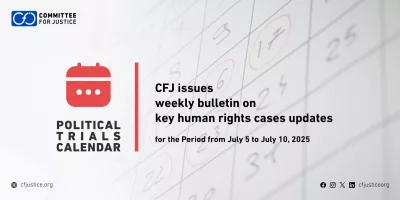The Committee for Justice (CFJ) has reported that recent political and economic developments in Egypt, including rising prices for services such as electricity, transportation, property transfer, communications, and steel, have severely impacted labor rights in the country. On April 7, 2024, President Sisi announced a decision to raise the minimum wage for state and public sector employees by up to 50%, reaching 6,000 Egyptian pounds (127 USD). However, exemptions for private micro-businesses employing fewer than 10 workers—comprising nearly two-thirds of Egypt’s workforce—have exacerbated labor unrest across the country.
CFJ’s report, submitted on the occasion of the Fourth Universal Periodic Review of Egypt’s compliance with human rights obligations, focused on labor rights and adherence to major international labor treaties. The report highlighted Egypt’s failure to implement recommendations from the previous Universal Periodic Review in 2019, which included 19 out of 372 recommendations related to labor rights. These recommendations called for enhancing labor legislation and rights, improving working conditions, combating forced and child labor, ensuring fair living wages, expanding social protection coverage, and promoting gender equality in Egypt. The Egyptian government has not addressed these recommendations and has maintained laws and practices that restrict workers’ rights and freedom of association.
As a result of this failure, the CFJ documented numerous labor movements between January and March 2024, including six strikes, three protests, and five sit-ins. These actions were in response to unmet economic and social demands, most of which centered on wage improvements. The incidents involved workers from both the public and private sectors, as well as government institutions.
The report also described the repression faced by the labor movement in Egypt, particularly highlighting the state’s response to the strike by workers at Egypt Spinning and Weaving Company. A large number of workers were summoned for investigation and threatened at the National Security headquarters in Gharbeya. Two of them, Wael Abu Zweid and Mohamed Mahmoud Tolba, were referred to the State Security Prosecution on February 26 and charged in Case No. 717 of 2024 with “joining an illegal group” and “spreading false rumors and news.” After three months of pretrial detention, they were released by the State Security Prosecution on May 27, 2024.
On April 29, 2024, State Security forces abducted Shadi Mohamed, a prominent labor activist, while he was returning home from work. As of the time of this report, his current whereabouts remain unknown. Additionally, on February 27, 2024, the Administrative Court in Cairo upheld a presidential decision to arbitrarily terminate the employment of a state employee at the Ministry of Justice, despite the employee receiving excellent performance evaluations over the past three years. This dismissal was based on amendments made by President Abdel Fattah al-Sisi on July 28, 2021, to Law No. 10 of 1972, concerning the non-disciplinary dismissal of public employees, known as the ” Brotherhood Dismissal Law.” These amendments grant the president and his delegates absolute authority to dismiss public employees without due legal process or investigation.
In conclusion, CFJ recommended that the Egyptian authorities ratify the remaining six of the thirteen fundamental International Labor Organization conventions. CFJ also stressed the importance of repealing the amendments made to Law No. 10 of 1972 concerning the non-disciplinary dismissal of public employees and revising local labor laws to ensure full compliance with International Labor Organization conventions.
CFJ further urged the Egyptian authorities to ensure decent working conditions and occupational health and safety standards for all workers, in accordance with the International Labour Organization’s Occupational Safety and Health Convention, 1981 (No. 155).
CFJ also called on Egypt to implement effective measures to eliminate forced labor and child labor, ensuring that perpetrators are prosecuted and punished. Furthermore, it emphasized the importance of guaranteeing fair living wages and expanding social protection coverage for all workers, including those in the informal sector, as outlined in the ILO’s Social Security (Minimum Standards) Convention, 1952 (No. 102), and the International Covenant on Economic, Social and Cultural Rights (Articles 7 and 9).






